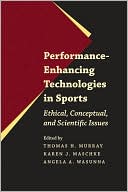List Books » Performance-Enhancing Technologies in Sports: Ethical, Conceptual, and Scientific Issues
Category Books
- Fiction Books & Literature
- Graphic Novels
- Horror
- Mystery & Crime
- Poetry
- Romance Books
- Science Fiction & Fantasy
- Thrillers
- Westerns
- Ages 0-2
- Ages 3-5
- Ages 6-8
- Ages 9-12
- Teens
- Children's Books
- African Americans
- Antiques & Collectibles
- Art, Architecture & Photography
- Bibles & Bible Studies
- Biography
- Business Books
- Christianity
- Computer Books & Technology Books
- Cookbooks, Food & Wine
- Crafts & Hobbies Books
- Education & Teaching
- Engineering
- Entertainment
- Foreign Languages
- Game Books
- Gay & Lesbian
- Health Books, Diet & Fitness Books
- History
- Home & Garden
- Humor Books
- Judaism & Judaica
- Law
- Medical Books
- New Age & Spirituality
- Nonfiction
- Parenting & Family
- Pets
- Philosophy
- Political Books & Current Events Books
- Psychology & Psychotherapy
- Reference
- Religion Books
- Science & Nature
- Self Improvement
- Sex & Relationships
- Social Sciences
- Sports & Adventure
- Study Guides & Test Prep
- Travel
- True Crime
- Weddings
- Women's Studies
Performance-Enhancing Technologies in Sports: Ethical, Conceptual, and Scientific Issues »

Authors: Thomas H. Murray (Editor), Karen J. Maschke (Editor), Angela A. Wasunna
ISBN-13: 9780801893612, ISBN-10: 0801893615
Format: Hardcover
Publisher: Johns Hopkins University Press
Date Published: September 2009
Edition: (Non-applicable)
Author Biography: Thomas H. Murray
Thomas H. Murray is the president of The Hastings Center and an adjunct professor of bioethics at the Case Western Reserve University School of Medicine. He has written extensively about medical ethics and is the coeditor of Genetic Ties and the Family, also published by Johns Hopkins. Karen J. Maschke is a research scholar at The Hastings Center and the editor of Gender and American Law. Angela A. Wasunna is the assistant director of international affairs at Pfizer, Inc., and the coauthor of Medicine and the Market, also published by Johns Hopkins.
Book Synopsis
This book brings together an interdisciplinary group of experts in bioethics, sports, law, and philosophy to examine the need for regulating such athletic performance-enhancing technologies as steroids and gene doping.
The use of performance-improving drugs in sports dates back to the early Olympians, who took an herbal tonic before competitions to augment athletic prowess. But the permissibility of doing so came into question only in the twentieth century as the popularity of anabolic steroid use and blood doping among athletes grew. Sports officials and others — aided by the development of technologies to test participants for proscribed substances — became concerned over the physical safety of athletes and competitive fairness in sporting events.
In exploring the culture, ethics, and policy issues surrounding doping in competitive athletics, the contributors to this volume detail the history and current state of drug use in sports, analyze the distinctions between acceptable and unacceptable usages, evaluate the ethical arguments for and against permitting athletes to avail themselves of new means of improving athleticism, and discuss possible future doping technologies and the issues that they are likely to raise. They explain how and why some athletes resort to doping and assess what the fair opportunity principle means in theory and practice and how it relates to the concept of an equal opportunity to perform.
This frank discussion of doping in sports includes accounts by former elite athletes and offers an illuminating exchange over the meaning and value of natural talents and genetic hierarchies and the essence of fair competition.
Table of Contents
Subjects
 Doping in Sports
Doping in SportsMedical Books
 Medicine
Medicine  Basic Sciences
Basic SciencesNonfiction
 Medicine
Medicine  Medicine
Medicine
